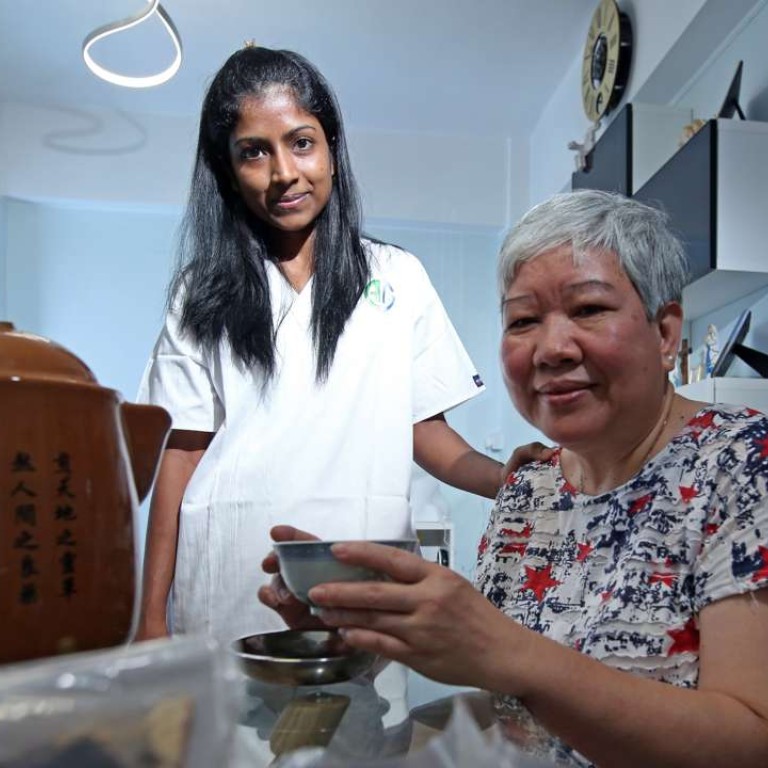
Calls to add specialised visa category for caregivers coming to Hong Kong
Specialised carers coming to Hong Kong to work for the elderly face lengthy delays as they must apply for domestic worker visas
When Wong Mei-ling hobbled out of the hospital after a brain tumour operation and facing a long road to recovery, Nirmala was waiting for her.
With nine years of experience as a hospital nurse in her native home of Sri Lanka, Nirmala was the reason why Wong dodged the fate of being put into an elderly care home, the 62 year old said.
Nirmala is one of almost 60 caregivers with nurse training employed by Hong Kong families from Sri Lanka and India through Active Global Specialised Caregivers, who brought them over using the foreign domestic worker visa. But the Singapore company’s Hong Kong branch manager, Steven Chiu, said Hong Kong’s domestic worker visa is proving a problem for the business, because it takes two and a half months to process, which means families who need immediate help in caring for an elderly person would not get it.
In comparison, it only takes two weeks to process a similar application in Singapore, where the business is booming, said Chiu.
“The best is to have a visa category for caregivers,” said Chiu, who said differentiating hires with expertise in caring for the elderly would also help to make the job more respectable. “The biggest problem right now though is the visa processing time.”
Chiu said many of the company’s clients looked to them as an alternative to putting the elderly into an elderly home, especially when the care needs of the elderly involved exceeds that a domestic worker’s training.
And in Hong Kong’s limited private sector when it comes to elderly services, any extra alternative is good, said Elderly Commission chairman Dr Lam Ching-choi.
Hong Kong’s community and elderly home care services are usually provided by NGOs who are heavily subsidised by the government, which makes it hard for companies to compete, said Lam.
“If somehow more workers who can give targeted care to elderly can be hired through the current visa scheme, it is a good thing,” added Lam, but said opening up another visa category had long been a controversial topic, as it could be seen as endangering local jobs.
Chiu calls the company’s hires “caregivers”, and while they are also coming to Hong Kong under the same visa requirements as common domestic workers, their wages are HK$4,000 to HK$6,000, which the employer directly pays the caregiver. The company charges the client a one-off fee of HK$14,800, but does not charge the caregiver anything.
In the short nine months with Wong, Nirmala had learnt how to brew Chinese medicine, picked up simple Cantonese and Chinese writing and became an inextricable part of Wong’s life.
The Sri Lankan helper would massage her legs daily, which she had trouble moving because of the tumour, as well as help with physiotherapy exercises.
Once an elderly person is hospitalised for a stroke, or a bad fall, among other issues with deteriorating health, the care he or she needs would only grow. And with the increased medical and care necessities, the choices in Hong Kong are few: either an elderly home or hire a domestic worker.
The government had advocated for “ageing in place” but had yet to stop the trend of elderly entering residential homes prematurely, nor have the administration been successful in helping the elderly ease back into their daily lives after a hospital stint.
Lam, who is also the chief executive of Haven of Hope, which operates a hospital, NGO and also private services of elderly community care, said Hongkongers are still not used to paying for such services traditionally provided for by the government. The private home services aren’t in much demand, he added.
